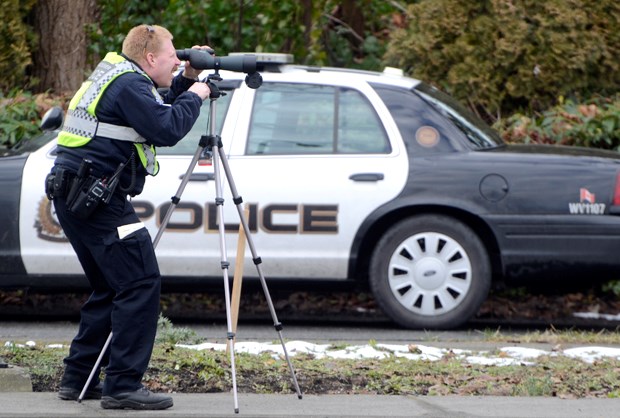Four years after B.C. banned drivers from using electronic devices behind the wheel, people are apparently still not getting the message.
Police agencies around the province just wrapped a month-long distracted driving enforcement campaign that saw the North Shore's two forces net almost three times as many offenders as last year's effort.
Officers issued 110 tickets in February compared to 40 during distracted driving month last year.
"Those numbers indicate to us that there's no shortage of people out there and if officers are looking, they're finding them," said Const. Jeff Palmer, West Vancouver police spokesman.
West Vancouver police and the North Vancouver RCMP made one final push on Feb. 27 to catch distracted drivers at Capilano Road and Marine Drive in North Vancouver.
Four North Vancouver RCMP officers issued a total of 15 violation tickets for distracted driving, including an impaired driver, according to spokesman Cpl. Richard De Jong.
"They observed an individual male talking on the phone, pulled him over and observed symptoms of impairment and alcohol," said De Jong.
The driver failed a breathalyzer test and received a 90-day driving prohibition.
The departments were out from 10 a.m. to noon, using a number of strategies to catch people in the act, including plainclothes officers and a high-powered scope that allows the viewer to see a distance of up to three city blocks.
De Jong said cellphones are still the number one distraction, whether taking a call or texting, but drivers have also been caught video conferencing.
"Anything that your electronic device can do is a distraction and is illegal," said De Jong. "So whether you're playing games to speaking on the phone to texting, doing your bank book, whatever, it's all illegal."
West Vancouver Cpl. Jag Johal said they would do whatever it takes to get people off the phone and ensure the public is safe.
"When you're driving, it might seem silly to you that the police are out there standing on the corner, behind telephone poles, at bus stops, looking for distracted drivers; however, there is a big cost associated to it when you do get into an accident," he said.
Twice during the month, Johal and his partner ticketed people who had been busted for the same thing just a week or two earlier. One of them reportedly responded with "Oh, not you again!" Palmer said. In another case, the driver admitted he had been given a warning for distracted driving just 45 minutes earlier.
"Not only is all the education and awareness not working, but in some cases, people are getting a violation ticket and it isn't stopping them the next week," Palmer said.
And you aren't fooling anyone with the phone-inthe-lap technique, Palmer said, which isn't any safer. The same goes for eating, having a dog in your lap or "personal grooming," which are all ticketable offences.
"It's just one more way your eyes are being taken off the road," he said.
Only speeding and impaired driving result in more fatalities on the road but it would take a sociologist to explain why talking on a cellphone doesn't induce the same moral indignation as seeing someone behind the wheel drunk.
"The statistics around injuries and fatalities where distracted driving is linked as a causal factor just continue to be startling and jarring," said Palmer. "People really need to think carefully about it for their own safety and for the safety of everybody else on the road."
In December last year, a head-on crash on the Lions Gate Bridge led to all three lanes being closed and total gridlock on the North Shore for hours. The driver who caused the crash has since been ticketed for distracted driving. He remains at home recovering from a broken pelvis, heel, arm and nose.
"It seems like an innocuous thing if people are just on their own, (they) think it's just a phone call or it's just a text it's not that serious of an issue and yet it can just go so quickly into an injury or a fatality collision," he said.
The collaboration between the two departments for the distracted driving campaign has been in effect for several years and will continue, said De Jong.
However, officers are always on watch throughout the year, De Jong added.
"They are constantly monitoring drivers as they are out on patrol and you just never know where or when we will show up," he said. "Accidents are very costly and sometimes life costing consequence can happen in seconds and it just isn't worth it."



